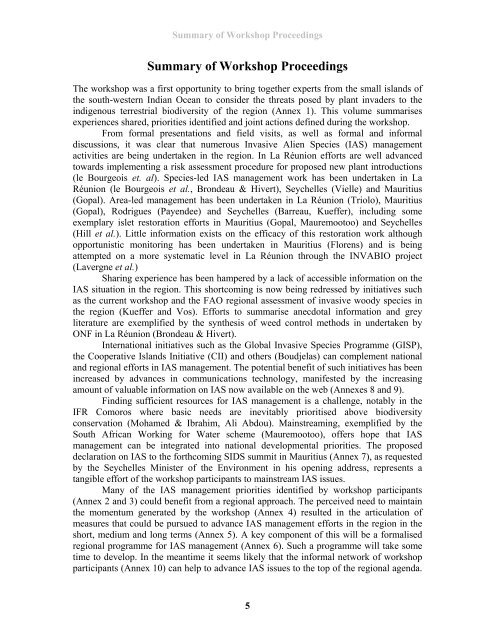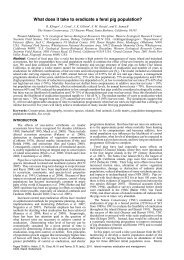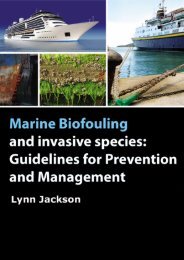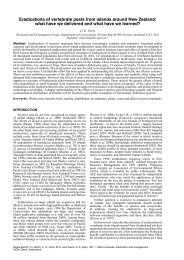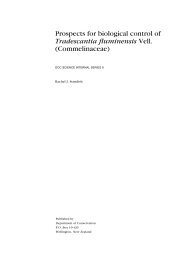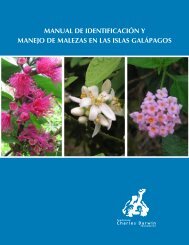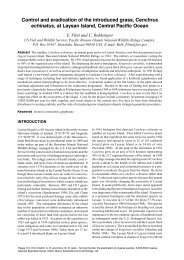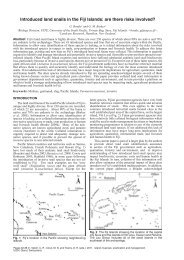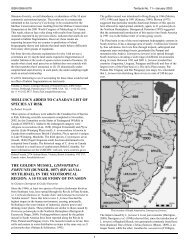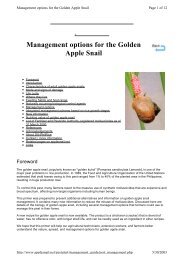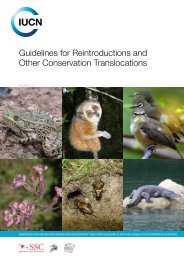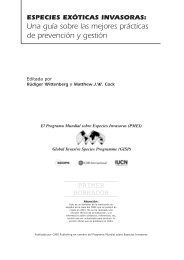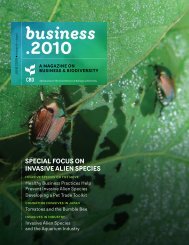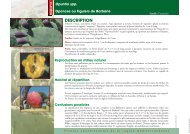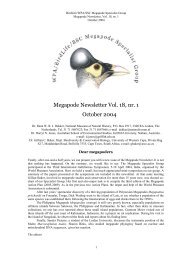Woody Invasive Species: A Regional Assessment - IUCN Invasive ...
Woody Invasive Species: A Regional Assessment - IUCN Invasive ...
Woody Invasive Species: A Regional Assessment - IUCN Invasive ...
Create successful ePaper yourself
Turn your PDF publications into a flip-book with our unique Google optimized e-Paper software.
Summary of Workshop Proceedings<br />
Summary of Workshop Proceedings<br />
The workshop was a first opportunity to bring together experts from the small islands of<br />
the south-western Indian Ocean to consider the threats posed by plant invaders to the<br />
indigenous terrestrial biodiversity of the region (Annex 1). This volume summarises<br />
experiences shared, priorities identified and joint actions defined during the workshop.<br />
From formal presentations and field visits, as well as formal and informal<br />
discussions, it was clear that numerous <strong>Invasive</strong> Alien <strong>Species</strong> (IAS) management<br />
activities are being undertaken in the region. In La Réunion efforts are well advanced<br />
towards implementing a risk assessment procedure for proposed new plant introductions<br />
(le Bourgeois et. al). <strong>Species</strong>-led IAS management work has been undertaken in La<br />
Réunion (le Bourgeois et al., Brondeau & Hivert), Seychelles (Vielle) and Mauritius<br />
(Gopal). Area-led management has been undertaken in La Réunion (Triolo), Mauritius<br />
(Gopal), Rodrigues (Payendee) and Seychelles (Barreau, Kueffer), including some<br />
exemplary islet restoration efforts in Mauritius (Gopal, Mauremootoo) and Seychelles<br />
(Hill et al.). Little information exists on the efficacy of this restoration work although<br />
opportunistic monitoring has been undertaken in Mauritius (Florens) and is being<br />
attempted on a more systematic level in La Réunion through the INVABIO project<br />
(Lavergne et al.)<br />
Sharing experience has been hampered by a lack of accessible information on the<br />
IAS situation in the region. This shortcoming is now being redressed by initiatives such<br />
as the current workshop and the FAO regional assessment of invasive woody species in<br />
the region (Kueffer and Vos). Efforts to summarise anecdotal information and grey<br />
literature are exemplified by the synthesis of weed control methods in undertaken by<br />
ONF in La Réunion (Brondeau & Hivert).<br />
International initiatives such as the Global <strong>Invasive</strong> <strong>Species</strong> Programme (GISP),<br />
the Cooperative Islands Initiative (CII) and others (Boudjelas) can complement national<br />
and regional efforts in IAS management. The potential benefit of such initiatives has been<br />
increased by advances in communications technology, manifested by the increasing<br />
amount of valuable information on IAS now available on the web (Annexes 8 and 9).<br />
Finding sufficient resources for IAS management is a challenge, notably in the<br />
IFR Comoros where basic needs are inevitably prioritised above biodiversity<br />
conservation (Mohamed & Ibrahim, Ali Abdou). Mainstreaming, exemplified by the<br />
South African Working for Water scheme (Mauremootoo), offers hope that IAS<br />
management can be integrated into national developmental priorities. The proposed<br />
declaration on IAS to the forthcoming SIDS summit in Mauritius (Annex 7), as requested<br />
by the Seychelles Minister of the Environment in his opening address, represents a<br />
tangible effort of the workshop participants to mainstream IAS issues.<br />
Many of the IAS management priorities identified by workshop participants<br />
(Annex 2 and 3) could benefit from a regional approach. The perceived need to maintain<br />
the momentum generated by the workshop (Annex 4) resulted in the articulation of<br />
measures that could be pursued to advance IAS management efforts in the region in the<br />
short, medium and long terms (Annex 5). A key component of this will be a formalised<br />
regional programme for IAS management (Annex 6). Such a programme will take some<br />
time to develop. In the meantime it seems likely that the informal network of workshop<br />
participants (Annex 10) can help to advance IAS issues to the top of the regional agenda.<br />
5


